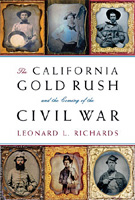home | metro silicon valley index | the arts | books | review

The California Gold Rush and the Coming of the Civil War
(By Leonard L. Richards; Knopf; $25; 290 pages)
After the discovery of gold, California became the flashpoint for a great national debate. When the Congress considered statehood, the country had 15 free and 15 slave states—California would tip the balance. To Southerners, a free California could only point the way to disunion. In 1850, California was admitted as a free state, and in a decade's time, the country was divided for good. Historian Leonard L. Richards charts California's role in the disputes that led to the Civil War. For a slave owner like Henry Wise, California "was the solution to his—and every Virginia slaveholder's—problem." Wise figured that a slave worth $1,000 in his home state would triple in value in the gold mines. The free-staters come off no better; they didn't oppose slavery on moral grounds—they just didn't want blacks working their claims. The Chivalry faction of the California Democratic Party, known as the Chivs, wanted to divide the state, with the southern half reserved for slave owners. The wrangling lasted until the election of 1860, when Lincoln narrowly carried the state. In a fascinating subplot, Richards shows how the 1859 duel between Sen. David Broderick, a Free Soil Democrat, and David S. Terry, a judge and vehement Chiv, affected that election. Terry felled Broderick, but the Chivs were denounced for the infamous deed, and their fortunes faded.
Review by Michael S. Gant
Send a letter to the editor about this story.
|
|
|
|
|
|